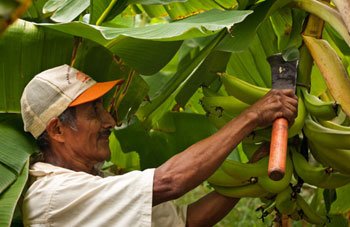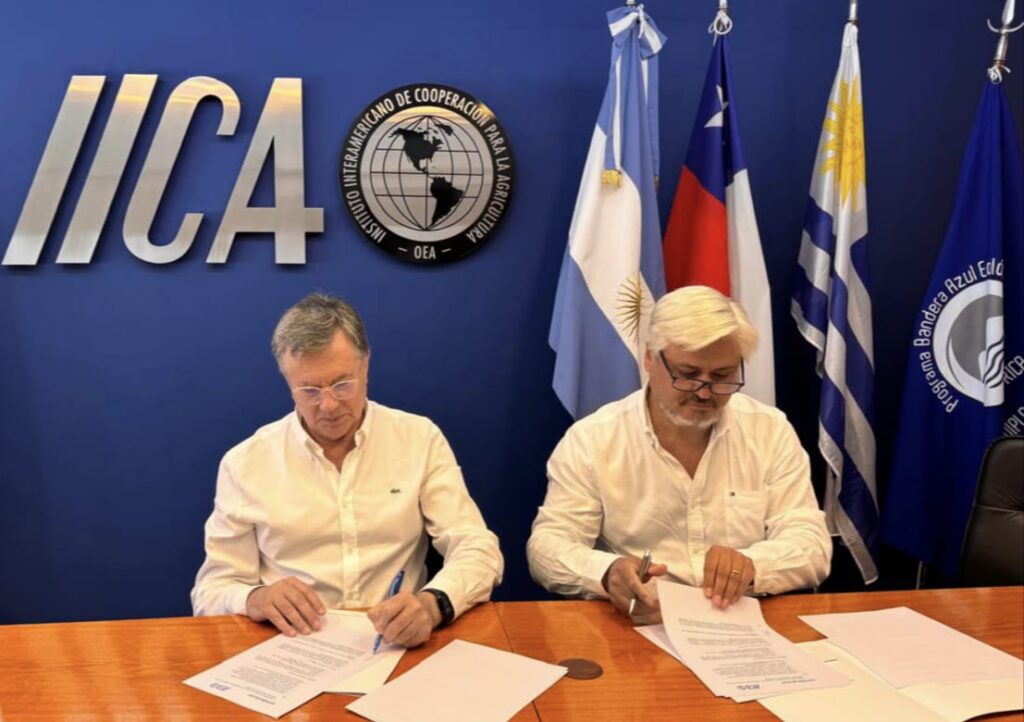El ambicioso Plan de Agricultura Familiar persigue, con el respaldo técnico del IICA, facilitar el acceso de miles de pequeños productores al mercado interno de alimentos de esta nación.
San Salvador, El Salvador, abril 2012 (IICA). En un país de rostro escarpado y piel deforestada, como El Salvador, cada metro cuadrado de tierra –que de por sí es limitada–, cada metro cúbico de agua y cada tonelada de esfuerzo humano para producir valen más, satisfacen más, porque su costo también es más.
Aquí hay al menos 395.000 productores agropecuarios (según un censo del 2008, el más reciente) que bregan para sobrevivir, alimentar a sus familias y vender los excedentes. De ellos, unos 325.000 trabajan en áreas menores a 2,1 hectáreas y consumen casi toda su producción; están ubicados en el segmento de la agricultura familiar de subsistencia.
Otros 65.000 labran territorios mayores a las 2,1 hectáreas y venden la mayor parte de los bienes producidos, por lo que obtienen recursos económicos que les permiten contratar mano de obra. Este es el segmento de la agricultura familiar comercial.

El tercer grupo, de unos 5.000, está más tecnificado y tiene propiedades de mayor tamaño. Son los grandes productores del país.
Dirigido a los dos primeros segmentos, el Ministerio de Agricultura y Ganadería salvadoreño (MAG) ejecuta el Plan de Agricultura Familiar (PAF), con el apoyo técnico del Instituto Interamericano de Cooperación para la Agricultura (IICA) y la Organización de las Naciones Unidas para la Alimentación y la Agricultura (FAO), entre otras entidades.
El plan se divide en cuatro programas: Abastecimiento Nacional para la Seguridad Alimentaria y Nutricional, Encadenamiento Productivo, Innovación Agropecuaria y Enlace con la Industria y el Comercio.
“En El Salvador, no le apostamos a lo agrícola en los últimos 30 años. Eso lo tenemos que cambiar a través de un plan que todo el mundo entienda, acompañado con instituciones que sepan qué es lo que se debe de hacer, para no perder el tiempo escribiendo cosas”, expresó el ministro Guillermo López, quien regularmente visita los sitios donde el PAF cobra su verdadero sentido, o sea, en el campo, kilómetros lejos su oficina.
Con los recorridos, López quiere sentir cómo palpita el proyecto estrella de la Administración Funes, a la que le restan poco más de dos años de gobierno.
El IICA apoya el programa de abastecimiento del PAF mediante la gestión de insumos agropecuarios, pero concentra su cooperación técnica en el objetivo de facilitar la inserción de la agricultura familiar comercial en los encadenamientos productivos, en específico en ocho sectores priorizados por el MAG: café, ganadería (lácteos), miel, frutas, hortalizas, cacao, acuicultura y granos básicos (frijol y maíz).
Con estos agricultores, el Instituto aplica la metodología de Escuelas de Campo, en las que especialistas técnicos del IICA, el MAG y el Centro Nacional de Tecnología Agropecuaria y Forestal (CENTA) dan capacitaciones en las mismas parcelas productivas.
Se trata de sectores vitales, pues por un lado generan empleo e ingresos a las zonas rurales y esto ayuda a combatir la pobreza, y por el otro están llamados a atender una demanda interna insatisfecha, que lleva a las familias a importar cerca del 70% de los alimentos que consumen.
Entonces, es en este mercado, abastecido mayoritariamente por aviones y camiones que llegan de otros países, donde pierden la batalla las tierras escarpadas y deforestadas salvadoreñas y los pequeños productores agropecuarios que dependen de ellas.
Revalorización de la agricultura familiar
De acuerdo con Gerardo Escudero, Representante del IICA en El Salvador, el PAF es una especie de reencuentro del país con su agricultura.
“El mercado interno es el objetivo, la tarea por hacer es cómo vincular en él a los productores de pequeña escala, para aumentar la calidad de vida de las familias rurales”, manifestó Escudero, después de asistir el 22 de marzo reciente a una gira de campo que funcionarios del MAG hicieron a Jiquilisco (departamento de Usulután) y Tecoluca (en San Vicente), donde visitaron escuelas de campo en cada una de las cuales camaroneros, productores de chile y ganaderos se capacitaban para aumentar su productividad y competitividad.
Las capacitaciones, impartidas por técnicos de amplia experiencia y jóvenes recién graduados de la Escuela Nacional de Agricultura (ENA), atendían temas tan concretos como la elaboración de planes de negocios, la preparación de comederos para los camarones, cómo se aplica abono orgánico al chile en una casa malla (invernadero del medio tropical) o cómo se puede tratar la mastitis (endurecimiento de las ubres de las vacas).
“Los temas no nacen en un escritorio o en una oficina; son los temas sobre los que las personas demandan aprender”, sentenció el ministro López, en medio de una finca ganadera en Tecoluca. Al ministro allí nadie lo esperaba; de hecho, el MAG no avisa cuándo ni dónde hará las visitas.
Son horas de la tarde y en esta parcela apenas empieza la capacitación del día. Otras escuelas de campo arrancan desde la mañana, pero esta no, porque el ganado tiene su horario y es prioridad.
Rápidamente, así como llegó, la delegación emprende su regreso a la capital con cientos de kilómetros de por medio. Pero los técnicos y productores se quedan en el campo, donde palpita el PAF.
Más información:
gerardo.escudero@iica.int
Galería fotográfica










